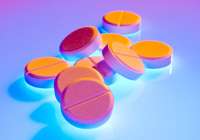(Medical Xpress)—People who regularly take medicines, such as aspirin, paracetamol and triptans could be causing themselves more pain than relief. New guidance out today (Wednesday 19 September) from the National Institute for Health and Clinical Excellence (NICE) advises GPs and other healthcare professionals to consider the possibility of "medication overuse" in their patients who have been taking medicines for up to half of the days in a month, over three months.
More than 10 million people in the UK experience regular or frequent headaches, making them one of the most common health complaints. They account for around 1 in 25 of GP consultations.
While common over-the-counter treatments are effective for easing the pain of occasional headaches, it has been estimated that approximately 1 in 50 people experience headaches caused by medication overuse and that women are five times more likely to get them than men. They occur when people take painkillers or triptan drugs too often for tension-type ("every day") headaches or migraine attacks. Doing this can reduce their effectiveness and cause further pain.
Martin Underwood, a GP and professor of primary care research at Warwick Medical School who chaired the guideline's development said: "We have effective treatments for common headache types. However, taking these medicines for more than ten or fifteen days a month can cause medication overuse headache, which is a disabling and preventable disorder.
"Patients with frequent tension-type headaches or migraines can get themselves into a vicious cycle, where their headaches are getting increasingly worse, so they take more medication which makes their pain even worse as they take more medication.
"I hope this guideline will improve awareness of medication overuse headache both in primary care and among the general public because prevention is simple and treatment is difficult. Explaining to patients that they should abruptly stop their medication, knowing that their headache will get much worse for several weeks before it will improve, is not an easy consultation."
This is the first time that GPs and other generalist clinicians will have practical guidance from NICE on the symptoms and features to look out for to diagnose medication overuse and primary headaches (i.e. those not caused by underlying health problems) and how they should be managed.
Peter May, who helped develop this guideline and has personal experience of cluster headaches said: "Having experienced cluster headaches for twelve years and initially being told that I was suffering from migraines, I believe there is a real need for diagnosis to be improved.
"The pain I experience in an attack lasts around forty-five minutes to an hour, and is excruciating, like being stabbed in my eye with a red hot poker. It took two years for me to receive a correct diagnosis, but I believe I am one of the fortunate ones as I know people who have gone twenty years. There are effective treatments available but they differ according to the type of headache and so having a correct diagnosis as soon as possible is crucial."
Dr Gillian Leng, Deputy Chief Executive of NICE said: "Although headache is the most common neurological problem seen by GPs and neurologists, many people are not receiving correct or timely diagnoses. The key features of medication overuse and the symptoms that distinguish the types of primary headache can be overlooked and concerns from patients about possible underlying causes can lead to unnecessary hospital investigations. These can mean people experience delays in receiving adequate pain relief from what can be an extremely disabling condition.
"Our guideline outlines the assessments and treatments that people should expect to receive for primary headaches and medication overuse. We hope that this will help GPs and other healthcare professionals to correctly diagnose the type of headache disorder and better recognise patients whose headaches could be caused by their over-reliance on medications."
Regarding medication overuse, NICE advises the NHS to be alert to the possibility in people whose headache developed or worsened while they were taking the following drugs for three months or more:
- Triptans, opioids, ergots or combination analgesic medications on 10 days per month or more or
- Paracetamol, aspirin and an NSAID [non-steroidal anti-inflammatory drug, e.g. ibuprofen], either alone or any combination, on 15 days per month or more.
Manjit Matharu, an honorary consultant neurologist at the National Hospital for Neurology and Neurosurgery and guideline developer said: "By clearly outlining the common features associated with primary headaches, the guideline will improve recognition and empower healthcare professionals to manage headaches more effectively, with better targeting of treatments. Also, it will enable healthcare professionals to undertake investigations confidently while avoiding the need for unnecessary brain scans.
"Clearly, neuroimaging is still an important diagnostic tool, but most peoples' headaches will not be caused by brain tumours or other serious health problems, and so these should not be offered to patients solely for reassurance."
More information: For further information about headaches, including statistics and definitions of the different types of headache, please visit NHS Choices: www.nhs.uk/conditions/headache … es/introduction.aspx
Provided by University of Warwick


















